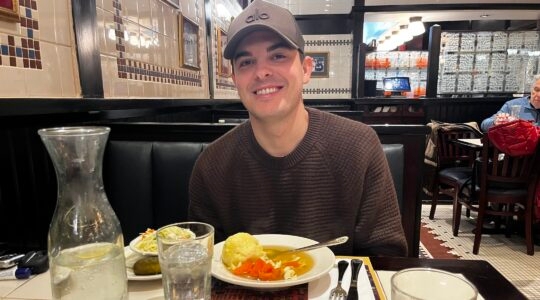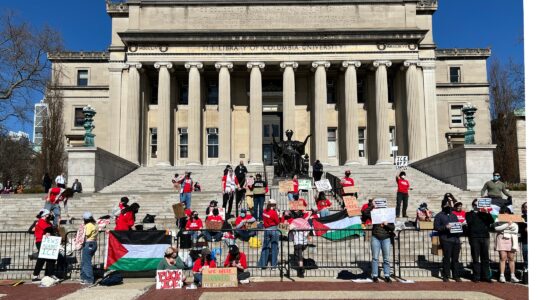For Jewish-American children of European immigrants of a certain age, the Shoah is more personal reality than historical memory. If they work in the arts, it is an open question that hangs in the air until it is finally faced. For composer and cantor Gerald Cohen, the time is now.
Cohen, whose compositions include elegant work in both concert music and liturgical settings, instrumental and vocal work alike, is premiering his first Shoah-themed composition on Feb. 4, “Playing for our lives.” The piece, which commemorates the cultural life of the Jews of Terezin, was commissioned by the Cassatt String Quartet, which will be performing the world premiere that evening.
“Maybe I was waiting for the right project, the thing that really spoke to me,” Cohen explained in a telephone interview Sunday. “My parents are both refugees from Europe, my father from Poland, my mother from Germany. Her family left after Kristallnacht; they all survived. My father left Poland in 1935, but his family stayed, and his mother and other relatives were killed. [The memories] were very much a part of growing up with European refugee parents.”
But Terezin was not part of those memories. How did Cohen come to write a piece that draws on that piece of history?
Indirectly, the credit goes to Ela Stein Weissberger, who as a child played the Cat in the original production at Terezin of Hans Krasa’s opera for children “Brundibar.” Not yet a teen, she played the role for 55 performances in the concentration camp.
Jennifer Leshnower, one of the Cassatt’s two violinists, explained in a telephone interview Sunday, “I went to hear Ela Weisberger speak at my synagogue last year and contacted her after and asked if she would like to do a project together. We [the Cassatt String Quartet] would create a program based in part on music written in Terezin.”
When they performed that program at the Brotherhood Synagogue about a year ago, Cohen was in the audience. It was bashert, fated. Cohen and the quartet talked about the possibility of working together on a new piece and the commission followed shortly.
As the recent program of Terezin-related events at the 92nd Street Y amply proves, the anomalous cultural blossoming that took place in that captivity has been an inspiration for many subsequent artistic endeavors. Certainly, that fact was in Cohen’s mind when he began working on the new composition.
“I decided I wanted to feature some of the music that was part of the musical life in Terezin,” he said. “I did a lot more reading and research, getting a sense of the sheer weirdness of the story: they were in this transit camp creating an incredibly rich cultural life yet knowing that at any moment they could be put on a transport to Auschwitz. I wanted the piece to tell that story, not in words, not in a literal way, but to convey the power of music, the power of art.”
“Playing” is structured around three musical themes: the Yiddish folk song “Beryozkele” (Little birch tree), which composer Viktor Ullmann arranged while he was in Terezin; the lullaby from “Brundibar” and excerpts from the Verdi Requiem, “a piece that was championed at Terezin by the dynamic conductor Rafael Schachter, [which] was performed many times, but by three different choruses, as after each of the first two performances, virtually the entire chorus was transported to their deaths at Auschwitz,” Cohen noted.
“The piece uses those elements to take us through the sense of brutality of what they were undergoing,” he explained. “The piece from “Brundibar” tries to give a sense of hope, the Verdi has its own brutality in the flashing chords of the Dies Irae, Day of Wrath, but [they] also bring a sense of mourning and comfort. [The quartet] ends with an elegy, transforming the folk song, with which I open.”
In the universe of the Shoah, opportunities for resistance to the Nazis were limited indeed. But for Cohen, the insistence of the Jews in Terezin on maintaining the integrity and centrality of their cultural life represents a profound and calculated rebuke to the Nazis.
“Music was their source of hope, with the terror that was present and hanging over them,” he said. “There are all those multiple levels to their use of the Verdi. Are they singing a requiem for themselves? They are [knowingly] performing a Catholic piece, but it’s the Jews singing it to the Nazis. And singing ‘Day of Wrath’ to them … It’s an act of resistance.”
That knowledge leaves Cohen with a profound sense of responsibility, “trying to give a small amount of the power of that piece for just a string quartet,” he said.
Leshnower and her colleagues have no doubt that he has succeeded.
“We certainly got everything we expected and more,” she said emphatically. “Given what was attempted by the Nazis, we’d like to think this is a small victory propelling American Jewish culture forward.”
Gerald Cohen’s “Playing for our lives” will have its world premiere in a performance by the Cassatt String Quartet, Saturday, Feb. 4, at 6 p.m. at the Thalia (Broadway at 95th Street). The performance is part of the Symphony Space “Music of Now” eight-hour marathon. Contact Symphony Space at 212-864-5400 or www.SymphonySpace.org for additional information.
The piece will also be performed on April 22 by the quartet as part of Yom HaShoah observances at Shaarei Tikvah in Scarsdale, where Cohen serves as cantor.
The New York Jewish Week brings you the stories behind the headlines, keeping you connected to Jewish life in New York. Help sustain the reporting you trust by donating today.




